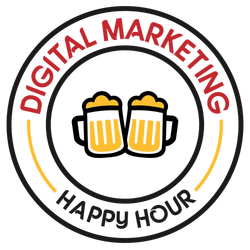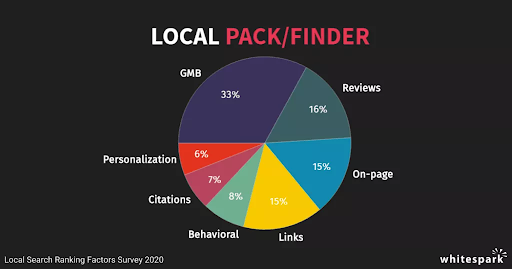Estimated reading time: 8 minutes
Why ranking on Google with Local SEO is vital for any brick-and-mortar location. We’ll explain what you need to do and show you how to optimize your assets to rank in Google for Local SEO. We’ll break down the difference between showing up in the Local Pack and Localized Organic Results in Google’s SERPs, and explain why it’s vital for any SMB with a brick-and-mortar location, no matter if you’re located in a large market or tucked away in a rural part of the country.
Why is Local SEO important?
When we think of SEO we typically think of any rankings in the Search Engine Result Page that appear that is not a paid ad. When taking it one step further we can break down localized organic rankings from Local SEO. What’s the difference between organic rankings and local SEO?
Ryan Smith: [00:03:10] In 2020 pre-pandemic, it was estimated there were more than 300,000 brick and mortar retail stores in the United States alone. You may have heard this, small businesses (SMBs) are the lifeblood of the United States economy, and in a pre-pandemic era, they accounted for about 44% of U.S. economic activity.
So when we talk about Local SEO, it’s really important for these small to medium-sized businesses (SMBs), these mom and pop shops, these retail outlets, to get visibility. And we’re going to go through again, break down the importance of that. When we think of SEO, we typically think of rankings in the search engine results page that appear, but that’s not a paid ad.
So when we take it one step further, we can break down localized organic rankings from local SEO. Well, what’s the difference between organic rankings and local SEO?
Well, there’s a couple of ways, especially when I talk to clients and they’re not exactly sure. I said, you see local SEO almost every single time you do a search, when you do a search and immediately you see the map pop up and then underneath that map, you’re going to see three different listings. That is your local SEO or your Local Pack results. When you go just below that, you’re going to see a few listings and that’s your localized organic results.
Now, obviously, one of the ways you can tell it’s localized, you might have your local city name in the listings or at least a nearby town in there. And that could be whether it’s the 10 best restaurants in {insert your city here} or the 50 best restaurants in that city, and you’ll see probably some of the bigger locations. So it could be the platforms.
If you’re looking for restaurants, for example, you might see a TripAdvisor, you might see a Zagat or something along those lines, maybe even Yelp located there, but they will be localized. So those are some of the big differences between your local park results. You’re localized organic results, and then anything underneath that is going to be just your typical organic rankings.
So, again, organic rankings are your nonpaid, but then we have sort of subsets of organic, your local SEO, your localized organic, and then your organic.
Chris Casale: [00:05:54] So Local Pack results and local organic results are very important and they’re both a little bit different. Right. As you mentioned, the Local Pack has, you know, usually has the business name. It’s got sometimes hours of operations.
Usually, it’s got a rating next to it. And very importantly, it’s got a photo. Sometimes it appears at the top of the page. If you’re on a mobile setting, if you’re on your desktop where your screen is a little bit wider, it might appear further off to the right. But this is a good place to be because your eye is often drawn to the images as well as the ratings and things like that.
So I wouldn’t say one is more important than the other, but if you had to pick one, showing up in that local park results is going to do more to get you more traffic than just being in the localized organic results. However, you want to appear on the localized organic results as well, because individuals that are clicking through to find something, your business will be front and center. And this is what makes local SEO so important.
If you serve customers locally, you should focus on improving your local search presence so more people can find you.
- 30% of all mobile searches are related to location. (Think With Google)
- 76% of people who search on their smartphones for something nearby visit a business within a day. (Think With Google)
- 28% of searches for something nearby result in a purchase. (Think With Google)
- Yelp appears in the top five search results for 92% of Google web queries that include a city and business category. (FreshChalk)
- 54% of smartphone users search for business hours and 53% search for directions to a local store. (Think With Google)
- About 45% of global shoppers buy online and then pick up in-store (Think With Google)
- “Where to buy” + “near me” mobile queries have grown by over 200% from 2017–2019. (Think With Google)
- Mobile searches for “store open near me” (e.g., “grocery store open near me”) have grown by over 250% from 2017–2019. (Think With Google)
- Mobile searches for “on sale” + “near me” (e.g., “tires on sale near me”) have grown by over 250% YOY from 2017–2019. (Think With Google)
How can I improve my local SEO ranking?
- Create a Google My Business Account.
- Get Regular Reviews from Happy Customers.
- Optimize for Voice Search.
- Create Content Based on Local News Stories or Events.
- Optimize Your Website for Mobile.
- Hone in on Local Keywords.
- Use Location Pages or a Location-Specific “About Us” Page.
- Take Advantage of Online Business Directories.
- Focus on Link Signals (Get High-Quality Backlinks)
- Create a Dedicated Webpage for Each Product/Service You Offer
Source: WordStream
Top GMB Local SEO Ranking Factors
Every other year or so Darren Shaw of Whitespark surveys some of the top Local SEOers in the industry to create the Local Search Ranking Factors Survey.
- Primary GMB Category
- Over 4,000 categories to choose from
- Keywords in GMB Business Title
- Keywords in the business name are an extremely strong ranking signal, but your business name needs to be your actual business name and shouldn’t be stuffed with keywords or you risk getting your listing suspended. (Though, a strong case could be made for actually changing your official business name since this factor is given so much weight in the local ranking algorithm. In fact, at the moment, this might be the #1 thing any business can do if they want to improve their local search rankings).
- Keywords in the business name are an extremely strong ranking signal, but your business name needs to be your actual business name and shouldn’t be stuffed with keywords or you risk getting your listing suspended. (Though, a strong case could be made for actually changing your official business name since this factor is given so much weight in the local ranking algorithm. In fact, at the moment, this might be the #1 thing any business can do if they want to improve their local search rankings).
- The Proximity of Address to the Point of Search (where users is located)
- You can generally only rank in about a maximum of 10 miles around your business’s physical location.
*Three of the most heavily weighted factors are factors that you technically have no control over. They aren’t actionable.
The remaining GMB factors will definitely have a positive impact on your local search rankings, and most of them are relatively quick and easy to optimize:
- Make sure your primary GMB category is the one that closest matches the most valuable search term you want to rank for.
- Make sure you’ve filled out every other available additional category that is relevant to your business – Side note: adding a bunch of unrelated categories to your listing will have an adverse effect to your ranking. Only
- Verify your listing (obviously).
- Fill out every field in GMB to ensure your listing is as complete as possible. This will help with conversions too!
Rate, Review and Subscribe to the Digital Marketing Happy Hour Podcast

If you feel like you learned something of value or maybe laughed a little, would you please consider leaving a rating and review?
Finally, if you haven’t done so already, please subscribe to the podcast, so that you don’t miss another episode. It’s a seamless way to stay informed and up-to-date on digital marketing.
Have any topic ideas you’d like to learn more about or have feedback from this episode?
Send an email to podcast@araxam.com
Subscribe
Apple, Spotify, iHeart, Stitcher, Audible or whatever podcast platform you prefer.
Recommended articles you may enjoy:

